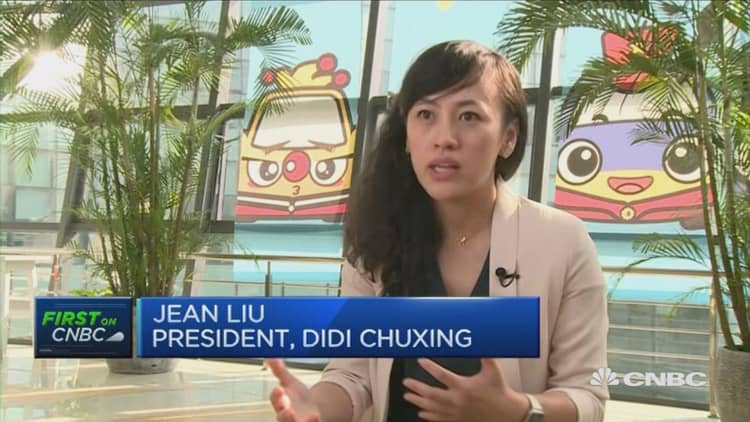
Securing $1 billion in investment from Apple was like "speed dating," the president of Chinese ride-hailing app Didi Chuxing told CNBC on Thursday.
"This [partnership] is still in a very preliminary stage. We got to know the Apple team, they got to know us not too long ago, but we clicked very quickly," laughed Jean Liu.
The surprise partnership, announced early this week, made sense for both parties given the amount of shared common ground, she said.
"We are both in the mobile internet space. So how do we serve our passengers, our drivers better? How do they [Apple] serve their users better? This is already a common ground...We also share a huge overlap in customer base. Our driver and passengers use iPhones and iPads a lot so I think it's very intuitive."
While Liu refused to comment on specific areas of collaboration, such as car technology or Apple Pay, she said "there are a lot of things that can happen.
Born from a strategic merger between taxi-hailing apps Didi Dache and Kuaidi Dache in 2015, Didi Chuxing's name translates to "Beep-beep! Mobility." Aside from private ride-sharing and taxis, Didi also offers services for carpooling, chauffeurs, buses as well as transport options for corporates, known as Didi Enterprise Solutions.
The company refers to its employees as "oranges" since the company's registered name—Xiaoju—means "little orange." When meeting Apple CEO Tim Cook in California last month, Liu reportedly said that a company named after a fruit could achieve something big.
China's massive market
In its first year alone, Didi Chuxing has witnessed rapid growth. Present in 400 Chinese cities, the company completes 11 million rides on a daily basis but that's still a fraction of China's ride market, according to Liu.
"In Beijing, the ride number we complete every day is 5-6 times the whole of New York's ridesharing market. So although the numbers sound big, it's only one percent penetration in China's market. The daily commutes for China is 1.1 billion so one percent penetration only gets us 11 million."
Given the sheer size of the market, it's no wonder that Liu, a former Goldman Sachs managing director, is concentrated on ensuring better supply and demand between vehicles, drivers and passengers. "What we are focused on right now is to improve our technology so we have the capability to predict— it's called demand prediction."
By compiling data on how often pickups are requested at certain locations, the system will alert drivers beforehand so when passengers send out requests, they can be matched immediately, she explained.
"But that needs to be based on a huge amount of data: big data analysis and AI capabilities. So be it a rainy day, weekend or peak hour, you will know how to predict demand, the system will learn gradually."
Outside of the big data push, Didi is committed to improving efficiency levels.
"The data analysis capability can give us more competitive advantage, that's number one. Number two, we are building a harmonious driver community, serving 4 million monthly active drivers and 14 million registered drivers. This is larger than any physical network. Nobody has managed this before, ever, in history."
Future plans
Liu reiterated that the firm had no plans at the moment for a U.S. initial public offering, quashing speculation following reports this week.
Regarding overseas expansion, Liu didn't discuss any new plans but said she was satisfied with Didi's partnerships with Uber rival Lyft in the U.S., GrabTaxi in Southeast Asia and Ola in India.
"These days more and more Chinese go overseas. Right now in the States, our Chinese travelers can easily access mobility service using Didi's app even without knowing English because we are working with Lyft....Our philosophy is believing in local champions. Because like us, they understand the market and regulatory background the most."


